Melodic Scriptures: 15 Bible Verses About Music
Music holds a timeless power that transcends cultural boundaries and speaks to the depths of the human soul. Throughout history, it has been a vehicle for expressing emotions, telling stories, and connecting.
From psalms of praise to hymns of lament, the Scriptures abound with wisdom on the role of music in worship, celebration, and everyday existence. In this post, we will explore a selection of Bible verses about music and the role it has in helping us connect with God and each other.
Music Quotes
Music in the Bible
Exodus 15:1
Then sang Moses and the children of Israel this song unto the Lord, and spake, saying, I will sing unto the Lord, for he hath triumphed gloriously: the horse and his rider hath he thrown into the sea.
Then Moses and the Israelites sang this song to the Lord:
“I will sing to the Lord,
for he is highly exalted.
Both horse and driver
he has hurled into the sea.
Then Moses and the people of Israel sang this song to the Lord:
“I will sing to the Lord,
for he has triumphed gloriously;
he has hurled both horse and rider
into the sea.
Then Moses and the people of Israel sang this song to the Lord, saying,
“I will sing to the Lord, for he has triumphed gloriously;
the horse and his rider he has thrown into the sea.
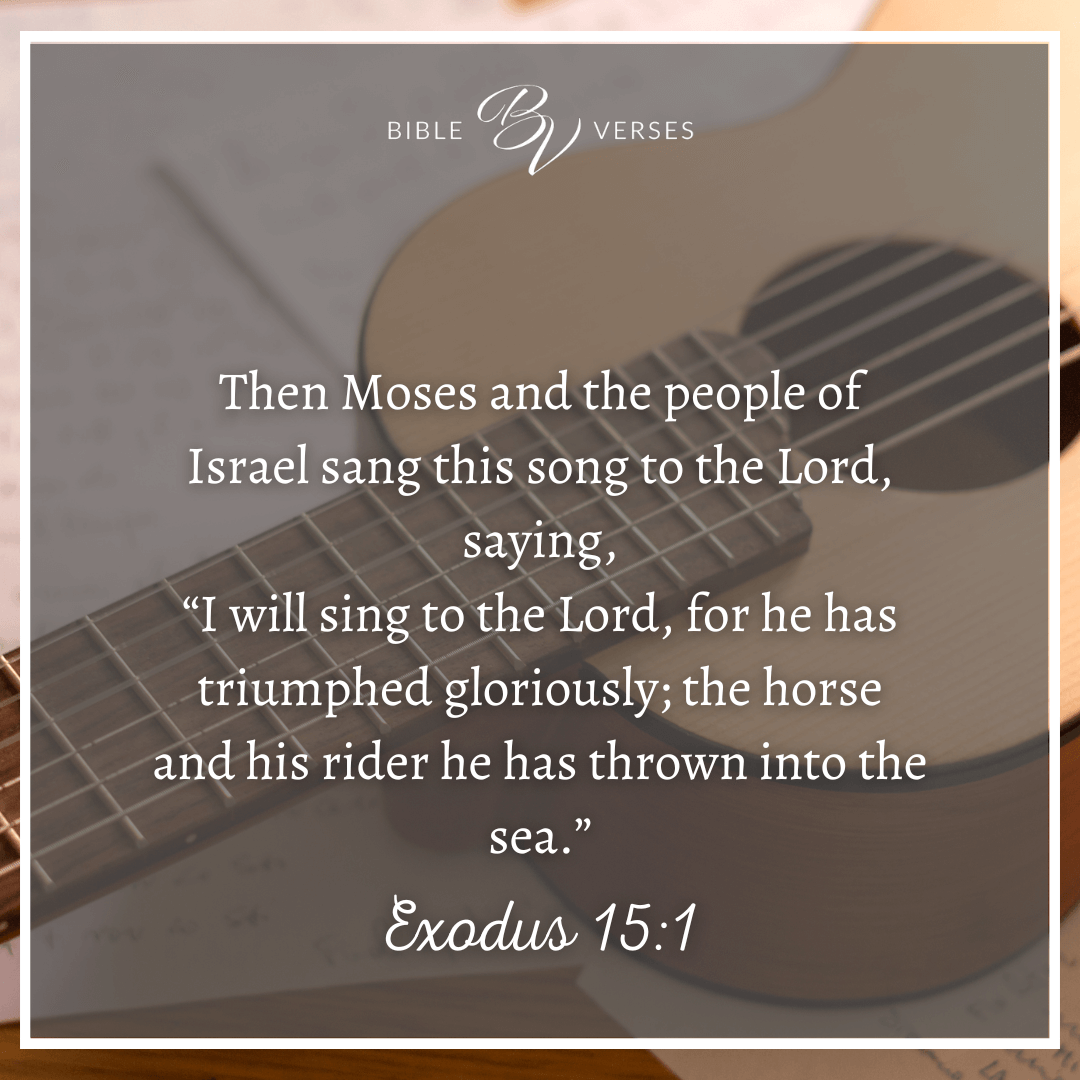
Exodus 15:1 is the opening verse of a song of triumph and praise sung by Moses and the Israelites after they had crossed the Red Sea safely, escaping from the Egyptian army. In this verse, Moses begins by extolling the Lord for His victory over their enemies, celebrating His strength and His salvation.
This verse marks the beginning of a poetic expression of gratitude and praise for God’s deliverance, which continues throughout the rest of Exodus 15.
Nehemiah 12:27
And at the dedication of the wall of Jerusalem they sought the Levites out of all their places, to bring them to Jerusalem, to keep the dedication with gladness, both with thanksgivings, and with singing, with cymbals, psalteries, and with harps.
At the dedication of the wall of Jerusalem, the Levites were sought out from where they lived and were brought to Jerusalem to celebrate joyfully the dedication with songs of thanksgiving and with the music of cymbals, harps and lyres.
For the dedication of the new wall of Jerusalem, the Levites throughout the land were asked to come to Jerusalem to assist in the ceremonies. They were to take part in the joyous occasion with their songs of thanksgiving and with the music of cymbals, harps, and lyres.
And at the dedication of the wall of Jerusalem they sought the Levites in all their places, to bring them to Jerusalem to celebrate the dedication with gladness, with thanksgivings and with singing, with cymbals, harps, and lyres.
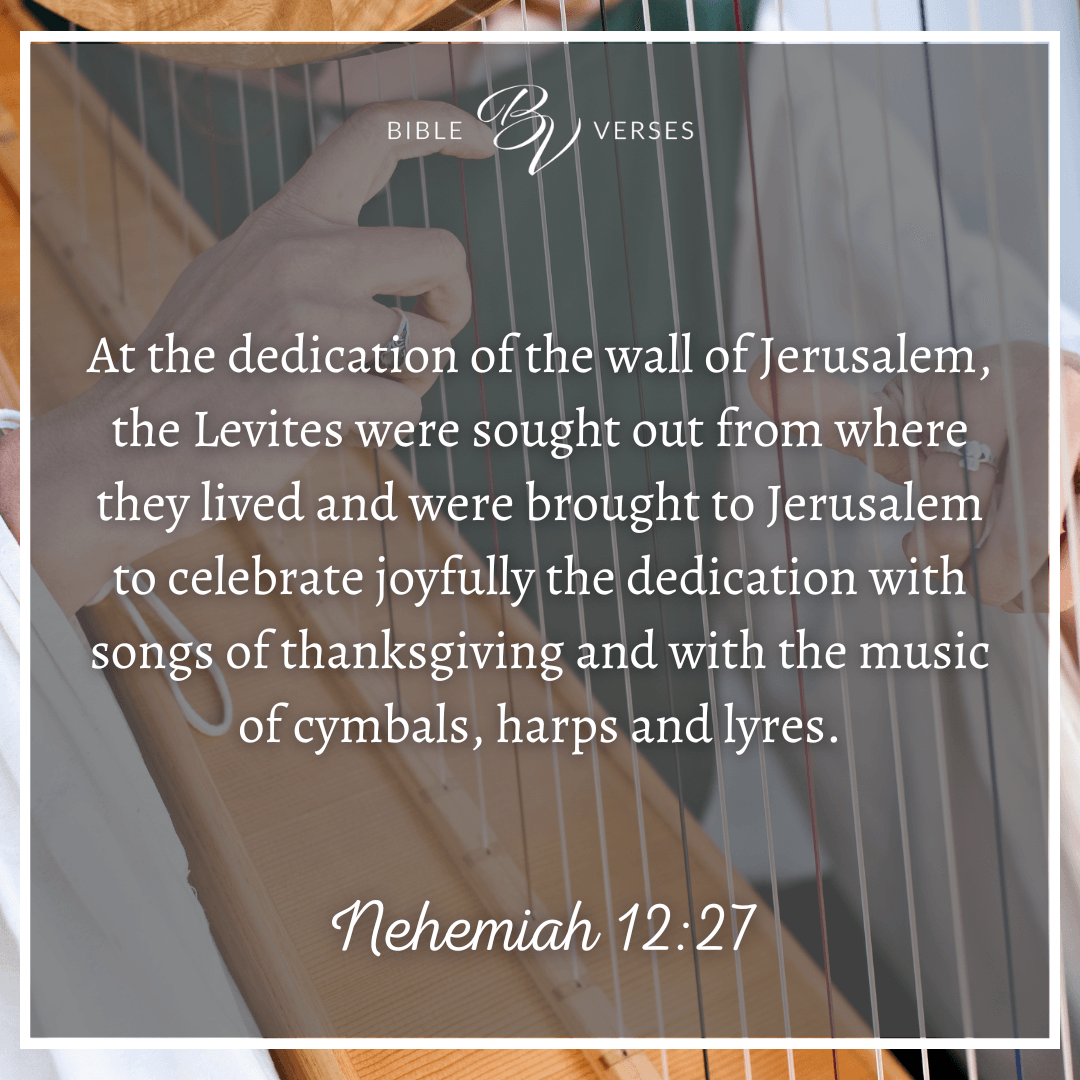
Nehemiah 12:27 describes a significant event in the dedication of the wall of Jerusalem, a moment of celebration and thanksgiving.
This verse highlights the role of the Levites, who were responsible for leading worship and music in ancient Israel, in the celebration of the completion and dedication of the rebuilt wall of Jerusalem. The event was marked with songs of thanksgiving and musical instruments, symbolizing the joy and gratitude of the people for God’s provision and protection.
1 Samuel 18:6
And it came to pass as they came, when David was returned from the slaughter of the Philistine, that the women came out of all cities of Israel, singing and dancing, to meet king Saul, with tabrets, with joy, and with instruments of musick.
When the men were returning home after David had killed the Philistine, the women came out from all the towns of Israel to meet King Saul with singing and dancing, with joyful songs and with timbrels and lyres.
When the victorious Israelite army was returning home after David had killed the Philistine, women from all the towns of Israel came out to meet King Saul. They sang and danced for joy with tambourines and cymbals.
As they were coming home, when David returned from striking down the Philistine, the women came out of all the cities of Israel, singing and dancing, to meet King Saul, with tambourines, with songs of joy, and with musical instruments.
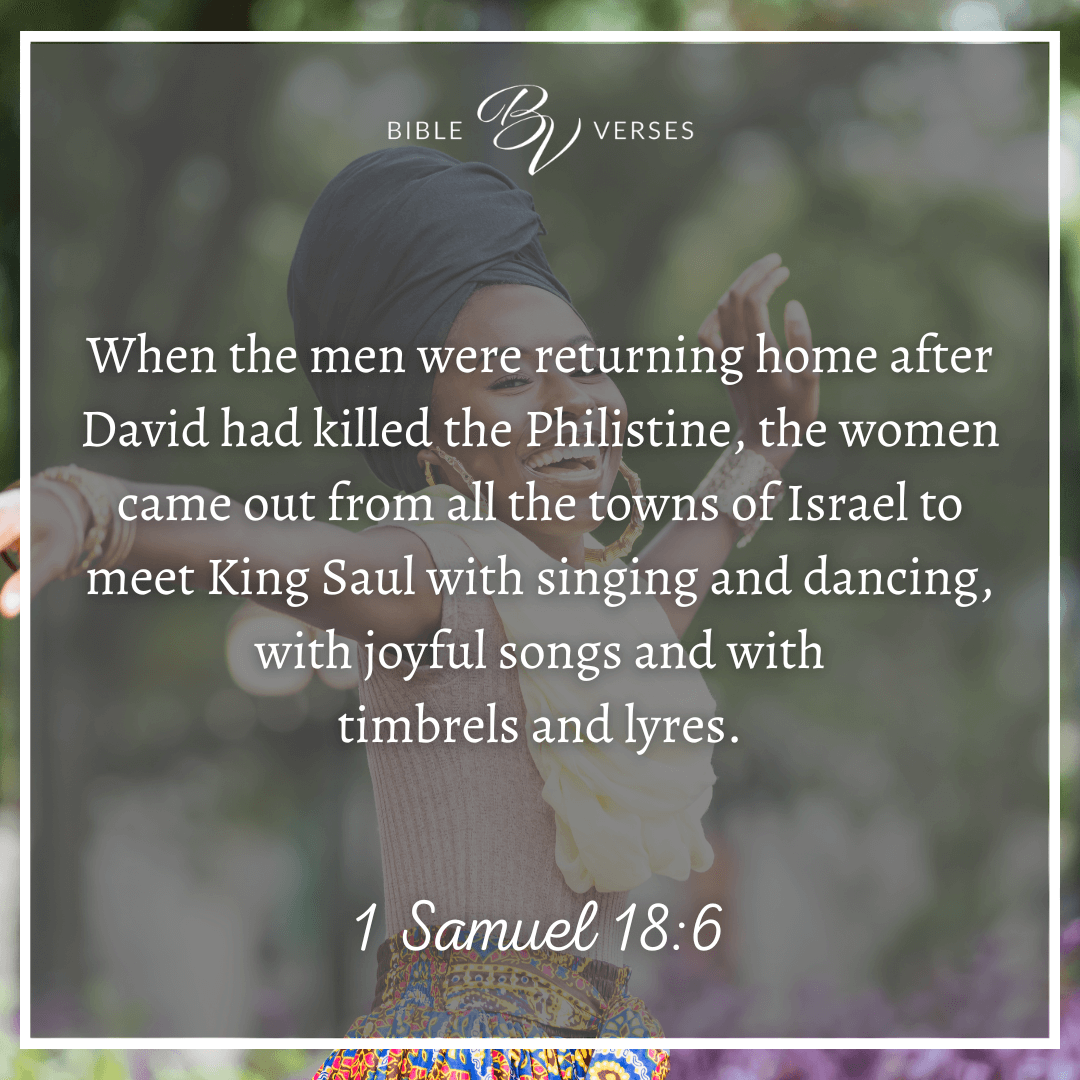
In this bible verse about music, a celebratory scene is described following David’s victory over Goliath and his subsequent rise to prominence in Israel.
This verse depicts a jubilant celebration in which the women of Israel, led by their cities’ inhabitants, come out to greet King Saul upon his return from battle. Their song and dance are in honor of David’s valor and success against Goliath, which has brought great relief and victory to Israel. The use of tambourines, songs of joy, and musical instruments reflect the festive atmosphere surrounding David’s triumph.
2 Chronicles 5:13
It came even to pass, as the trumpeters and singers were as one, to make one sound to be heard in praising and thanking the Lord; and when they lifted up their voice with the trumpets and cymbals and instruments of musick, and praised the Lord, saying, For he is good; for his mercy endureth for ever:
The trumpeters and musicians joined in unison to give praise and thanks to the Lord. Accompanied by trumpets, cymbals and other instruments, the singers raised their voices in praise to the Lord and sang:
“He is good;
his love endures forever.”
The trumpeters and singers performed together in unison to praise and give thanks to the Lord. Accompanied by trumpets, cymbals, and other instruments, they raised their voices and praised the Lord with these words:
“He is good!
His faithful love endures forever!”
and it was the duty of the trumpeters and singers to make themselves heard in unison in praise and thanksgiving to the Lord), and when the song was raised, with trumpets and cymbals and other musical instruments, in praise to the Lord,
“For he is good,
for his steadfast love endures forever,”
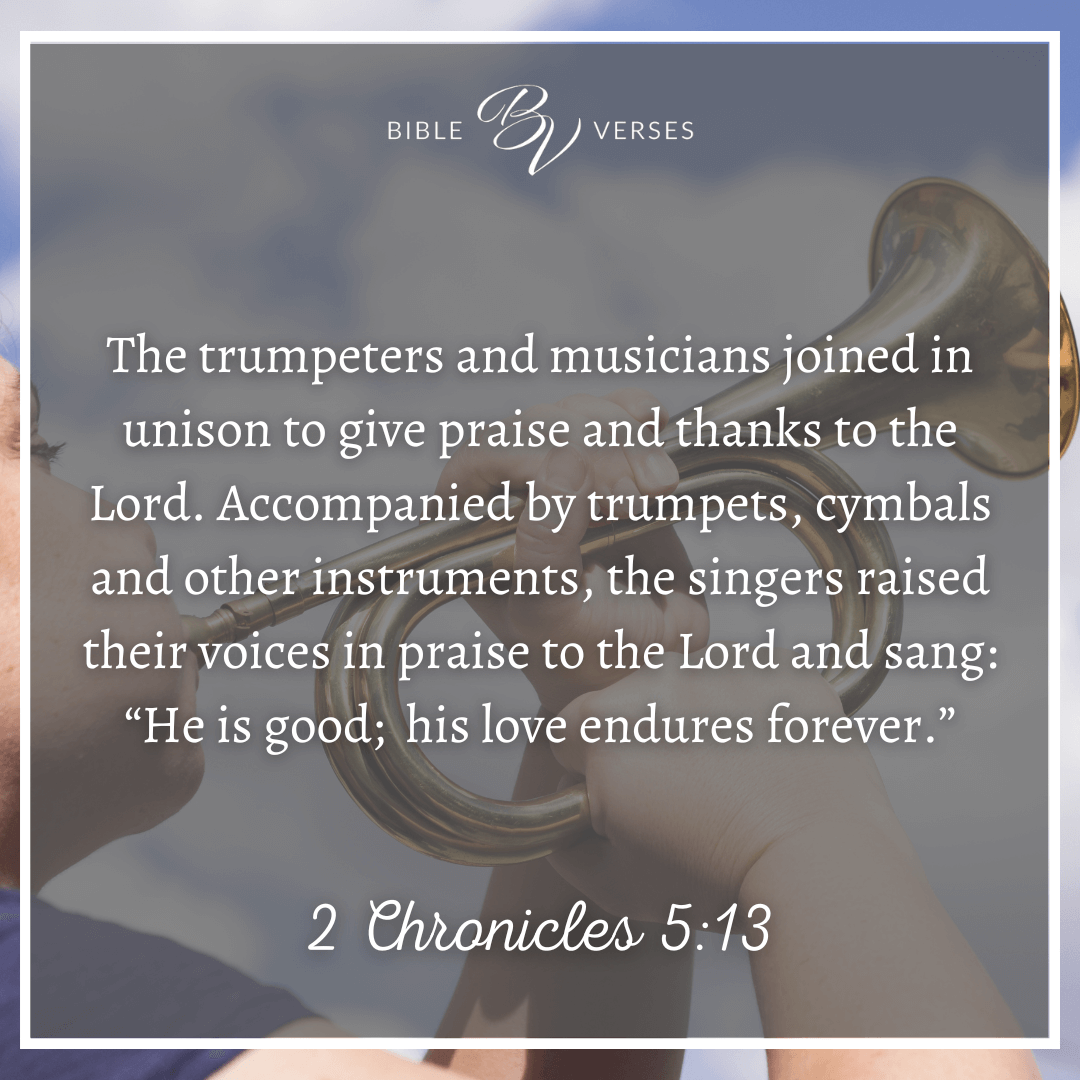
2 Chronicles 5:13 describes a momentous occasion in the history of ancient Israel: the dedication of Solomon’s temple.
This verse depicts a scene of worship and celebration as the priests, musicians, and singers come together in harmony to offer praise and thanks to the Lord.
The use of various musical instruments such as trumpets and cymbals, along with the voices of the singers, creates a symphony of worship. The phrase “He is good; his love endures forever” echoes throughout the temple, affirming God’s goodness and eternal love.
Psalm 22:22
I will declare thy name unto my brethren: in the midst of the congregation will I praise thee.
I will declare your name to my people;
in the assembly I will praise you.
I will proclaim your name to my brothers and sisters.
I will praise you among your assembled people.
I will tell of your name to my brothers;
in the midst of the congregation I will praise you:

The Book of Psalms is a collection of 150 poetic songs and prayers found in the Bible, traditionally attributed to King David and other authors. These psalms cover a wide range of emotions and themes, including praise, thanksgiving, lament, repentance, trust, and wisdom.
One of the central themes of the Psalms is worship and praise directed towards God. Many psalms exalt God’s character, recount His mighty deeds, and celebrate His attributes such as His holiness, faithfulness, and love. Additionally, the Psalms provide a rich vocabulary for expressing human emotions and experiences before God. They offer comfort and encouragement to those facing trials, while also prompting reflection and repentance for sin.
As such, this blog post and its collection of bible verses about music, will be fairly Psalm-heavy.
Psalm 22:22 is a bible verse about music in which the psalmist expresses gratitude and praise to God amidst distress and suffering.
In this scripture, the psalmist resolves to proclaim God’s name and praise Him publicly, likely referring to a vow made during a time of trouble. Despite the challenges and agony described earlier in the psalm, the speaker affirms their commitment to worship and glorify God among the congregation of believers.
This verse reflects a shift from lamentation to praise, emphasizing the psalmist’s trust in God’s faithfulness and deliverance.
Psalm 40:3
And he hath put a new song in my mouth, even praise unto our God: many shall see it, and fear, and shall trust in the Lord.
He put a new song in my mouth,
a hymn of praise to our God.
Many will see and fear the Lord
and put their trust in him.
He has given me a new song to sing,
a hymn of praise to our God.
Many will see what he has done and be amazed.
They will put their trust in the Lord.
He put a new song in my mouth,
a song of praise to our God.
Many will see and fear,
and put their trust in the Lord.

Psalm 40:3 is a verse that speaks of the transformative power of God’s intervention in the life of the psalmist.
In this verse, the psalmist reflects on his experience of being rescued by God from a place of despair or trouble. The phrase “He put a new song in my mouth” symbolizes the profound change and renewal brought about by God’s intervention. The psalmist’s response to this transformation is to offer a hymn of praise to God, acknowledging His faithfulness and salvation.
Additionally, the verse suggests that the psalmist’s testimony of God’s deliverance will inspire others to reverence and trust in the Lord.
Psalm 71:23
My lips shall greatly rejoice when I sing unto thee; and my soul, which thou hast redeemed.
My lips will shout for joy
when I sing praise to you—
I whom you have delivered.
I will shout for joy and sing your praises,
for you have ransomed me.
My lips will shout for joy,
when I sing praises to you;
my soul also, which you have redeemed.

In this verse, the psalmist declares his intention to praise God with joy and exuberance, particularly in the form of singing. The psalmist attributes his ability to rejoice and offer praise to God to His deliverance. This deliverance may refer to specific instances of rescue from trouble or adversity, or it could represent a broader acknowledgment of God’s ongoing presence and intervention in the psalmist’s life.
Overall, Psalm 71:23 reflects a heart overflowing with gratitude and worship, celebrating God’s saving power and expressing a deep commitment to praise Him in response to His faithfulness.
Psalm 95:1
O come, let us sing unto the Lord: let us make a joyful noise to the rock of our salvation.
Come, let us sing for joy to the Lord;
let us shout aloud to the Rock of our salvation.
Come, let us sing to the Lord!
Let us shout joyfully to the Rock of our salvation.
Oh come, let us sing to the Lord;
let us make a joyful noise to the rock of our salvation!

In this verse, the psalmist calls upon others to join in singing and shouting praises to the Lord, who is described as the “Rock of our salvation.” The imagery of God as a rock conveys stability, strength, and security, emphasizing His reliability and steadfastness.
This verse sets the tone for the entire psalm, which continues to exhort believers to worship God with reverence and gratitude, acknowledging His sovereignty and goodness. It encourages a heart of praise and celebration, recognizing God’s role as the source of salvation and the object of worship.
Psalm 98:1
O sing unto the Lord a new song; for he hath done marvellous things: his right hand, and his holy arm, hath gotten him the victory.
Sing to the Lord a new song,
for he has done marvelous things;
his right hand and his holy arm
have worked salvation for him.
Sing a new song to the Lord,
for he has done wonderful deeds.
His right hand has won a mighty victory;
his holy arm has shown his saving power!
Oh sing to the Lord a new song,
for he has done marvelous things!
His right hand and his holy arm
have worked salvation for him.
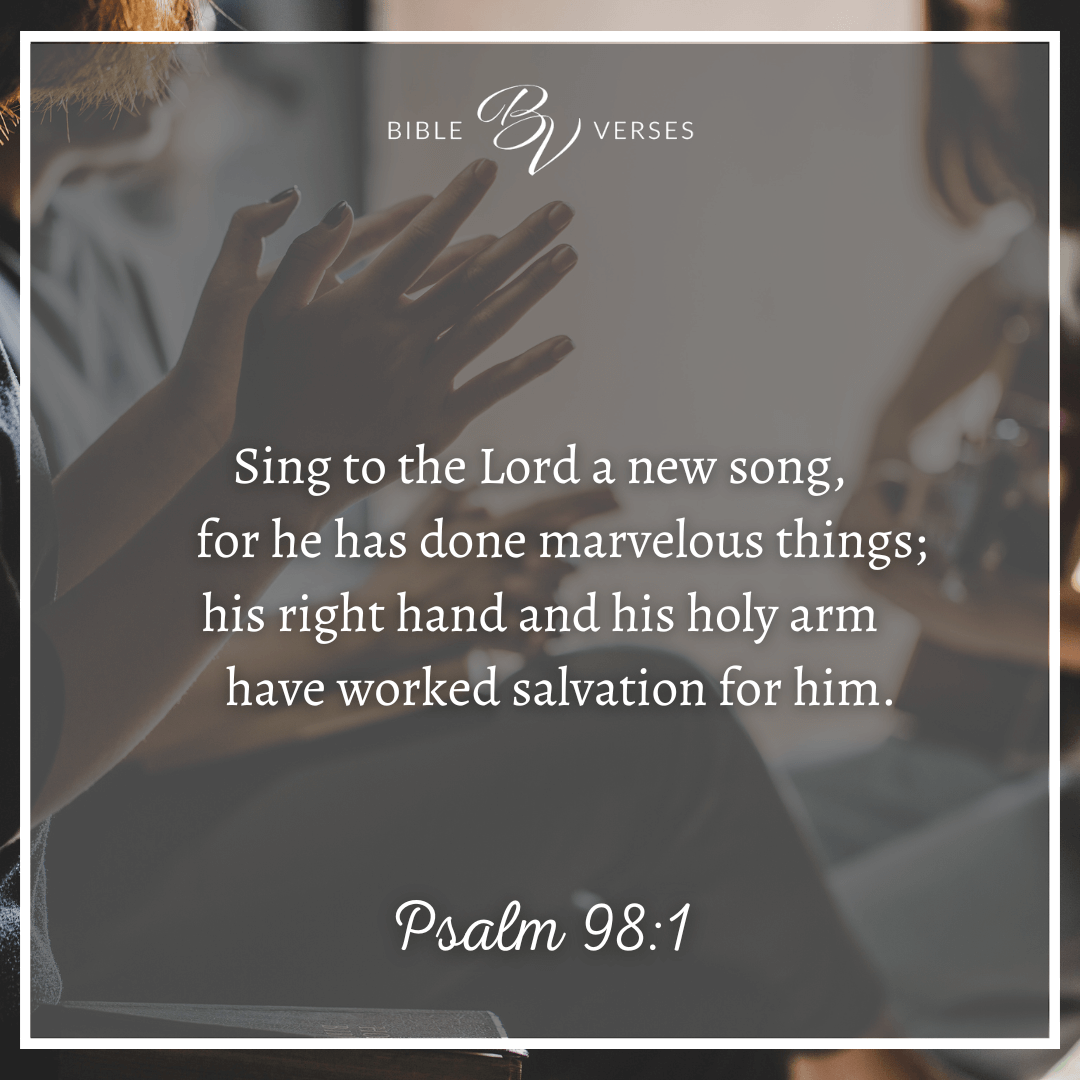
Psalm 98:1 is an invitation to praise God for His marvelous deeds and His salvation.
In this verse, the psalmist urges believers to sing a new song to the Lord, celebrating the wondrous acts He has performed. The phrase “marvelous things” highlights the awe-inspiring nature of God’s deeds, emphasizing His power, creativity, and sovereignty over all creation.
The reference to God’s “right hand” and “holy arm” symbolizes His strength and might in bringing about salvation, particularly through his son, Jesus, whom we later learn is seated at the right hand of the Father.
Overall, Psalm 98:1 calls believers to express their praise and gratitude to God for His remarkable works and His gift of the Savior.
Psalm 101:1
I will sing of mercy and judgment: unto thee, O Lord, will I sing.
I will sing of your love and justice;
to you, Lord, I will sing praise.
I will sing of your love and justice, Lord.
I will praise you with songs.
I will sing of steadfast love and justice;
to you, O Lord, I will make music.
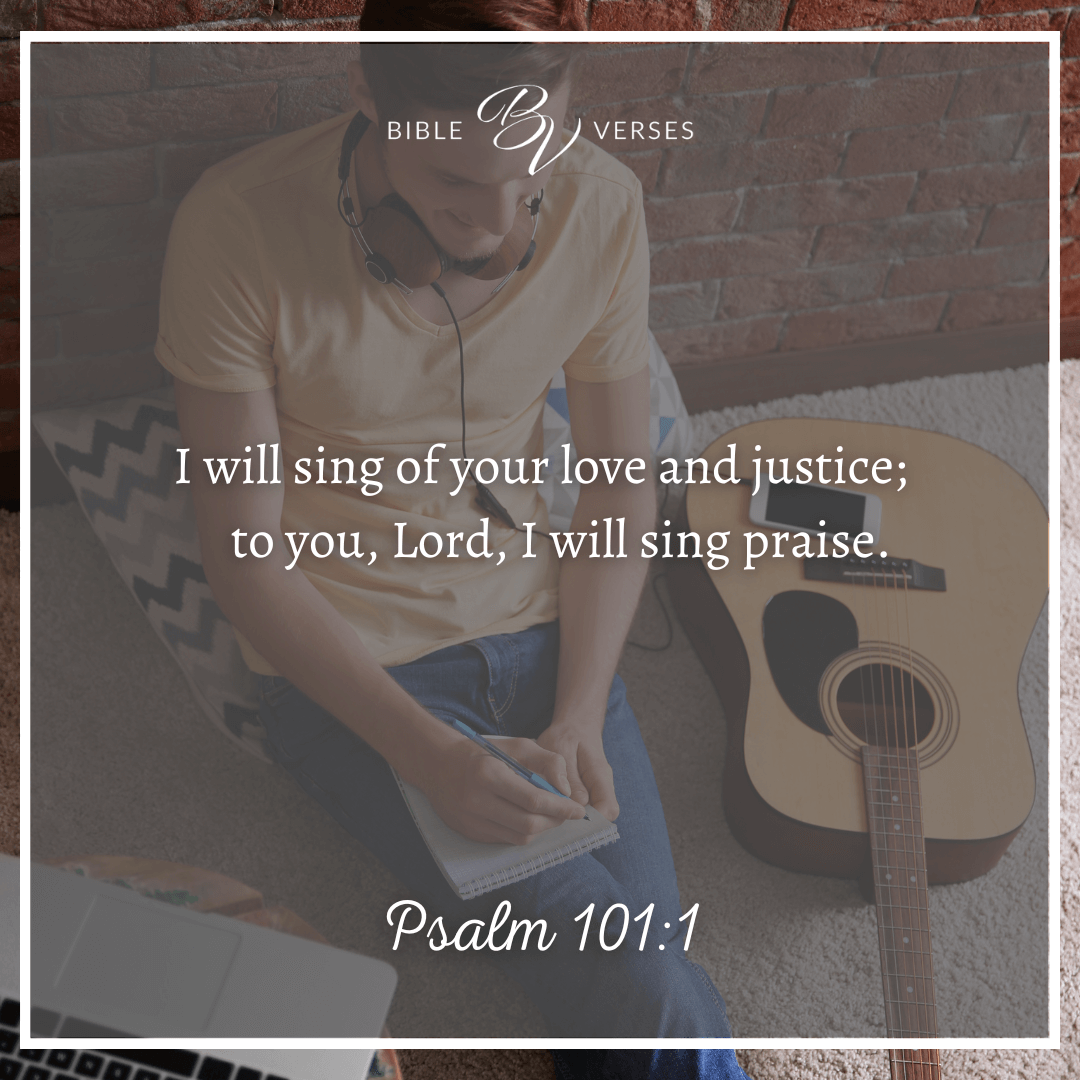
In this verse, the psalmist expresses his intention to praise God for His love and justice. The psalmist acknowledges God’s attributes of love, which encompasses His mercy, compassion, and faithfulness, as well as His justice, which involves His righteousness and fairness in administering judgment.
Psalm 105:2
Sing unto him, sing psalms unto him: talk ye of all his wondrous works.
Sing to him, sing praise to him;
tell of all his wonderful acts.
Sing to him; yes, sing his praises.
Tell everyone about his wonderful deeds.
Sing to him, sing praises to him;
tell of all his wondrous works!

Rounding out the Psalm-portion of this post, let’s look at Psalm 105:2. The act of singing praises to God is not merely an expression of musicality, but rather a profound form of worship that involves the heart, mind, and soul. Through singing, believers can express their adoration, awe, and reverence for God’s character and His works. It becomes a spiritual discipline that deepens one’s relationship with God and cultivates a heart of gratitude and worship.
Here, the psalmist emphasizes the importance of recounting stories of God’s goodness and faithfulness. This involves not only personal reflection but also sharing testimonies with others. By recounting God’s mighty deeds, believers reinforce their own faith and inspire others in theirs.
Overall, Psalm 105:2 encourages believers to engage wholeheartedly in worship, both individually and corporately, through singing praises to God and proclaiming His marvelous acts. It reminds us of the power of worship as a means of drawing closer to God, fostering unity among believers, and bearing witness to His role in our lives.
Zephaniah 3:17
The Lord thy God in the midst of thee is mighty; he will save, he will rejoice over thee with joy; he will rest in his love, he will joy over thee with singing.
The Lord your God is with you,
the Mighty Warrior who saves.
He will take great delight in you;
in his love he will no longer rebuke you,
but will rejoice over you with singing.
For the Lord your God is living among you.
He is a mighty savior.
He will take delight in you with gladness.
With his love, he will calm all your fears.
He will rejoice over you with joyful songs.
The Lord your God is in your midst,
a mighty one who will save;
he will rejoice over you with gladness;
he will quiet you by his love;
he will exult over you with loud singing.

In this verse, the prophet Zephaniah assures the people of Judah that God, portrayed as a Mighty Warrior who saves, is present among them. Despite any trials or challenges they may face, God is with them as their protector and deliverer.
The verse then describes God’s emotional response to His people. It states that God takes great delight in them and rejoices over them with singing. This imagery conveys the depth of God’s love and care for His people. It portrays God not only as a powerful and majestic deity but also as a tender and affectionate Father who finds joy in His children.
In this verse, God’s singing symbolizes His delight in His people and His desire for intimate communion with them. It’s a beautiful reminder of the profound connection between music and spirituality, and of the joy that comes from worshiping God with all our heart, soul, and strength.
Ephesians 5:19
Speaking to yourselves in psalms and hymns and spiritual songs, singing and making melody in your heart to the Lord;
speaking to one another with psalms, hymns, and songs from the Spirit. Sing and make music from your heart to the Lord,
singing psalms and hymns and spiritual songs among yourselves, and making music to the Lord in your hearts.
addressing one another in psalms and hymns and spiritual songs, singing and making melody to the Lord with your heart,
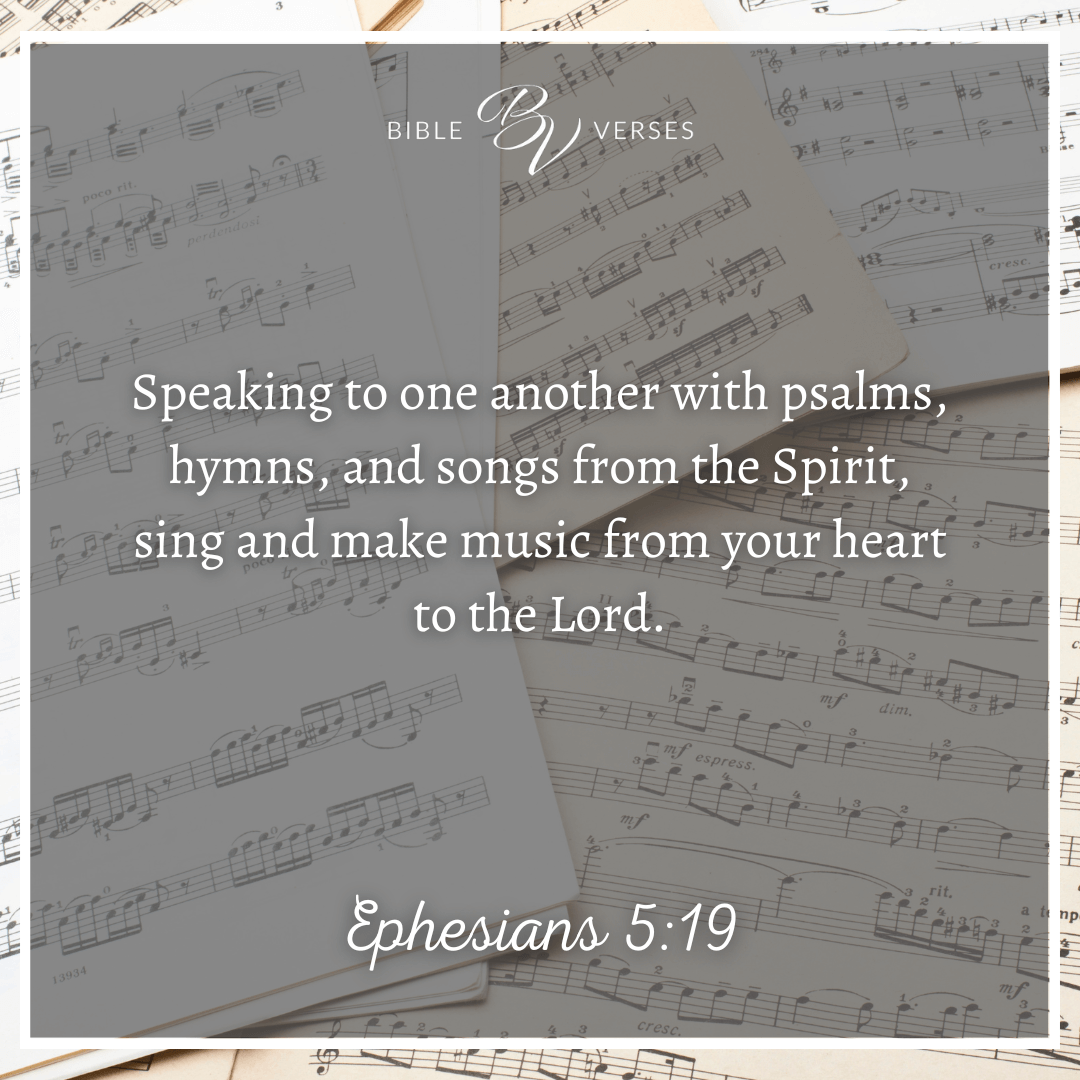
In Ephesians 5:19, the apostle Paul encourages believers to engage in corporate worship and spiritual edification. He instructs them to speak to one another with psalms, hymns, and spiritual songs. This implies not only the act of singing together but also the sharing of spiritual truths and encouragement through these forms of musical expression.
Furthermore, Paul emphasizes the importance of sincerity and authenticity in worship. He encourages believers to sing and make music from their hearts to the Lord, highlighting the inner disposition of worship rather than merely the outward performance. This underscores the idea that worship is a matter of the heart, characterized by genuine devotion and reverence towards God.
James 5:13
Is any among you afflicted? let him pray. Is any merry? let him sing psalms.
Is anyone among you in trouble? Let them pray. Is anyone happy? Let them sing songs of praise.
Are any of you suffering hardships? You should pray. Are any of you happy? You should sing praises.
Is anyone among you suffering? Let him pray. Is anyone cheerful? Let him sing praise.

James 5:13 underscores the significance of prayer and worship in the life of a believer, emphasizing their role in both times of trouble and times of joy. It encourages believers to maintain a posture of dependence on God, seeking Him in all circumstances and expressing gratitude and praise for His goodness and faithfulness.
Revelation 14:2-3
And I heard a voice from heaven, as the voice of many waters, and as the voice of a great thunder: and I heard the voice of harpers harping with their harps:
And they sung as it were a new song before the throne, and before the four beasts, and the elders: and no man could learn that song but the hundred and forty and four thousand, which were redeemed from the earth.
And I heard a sound from heaven like the roar of rushing waters and like a loud peal of thunder. The sound I heard was like that of harpists playing their harps. And they sang a new song before the throne and before the four living creatures and the elders. No one could learn the song except the 144,000 who had been redeemed from the earth.
And I heard a sound from heaven like the roar of mighty ocean waves or the rolling of loud thunder. It was like the sound of many harpists playing together.
This great choir sang a wonderful new song in front of the throne of God and before the four living beings and the twenty-four elders. No one could learn this song except the 144,000 who had been redeemed from the earth.
And I heard a voice from heaven like the roar of many waters and like the sound of loud thunder. The voice I heard was like the sound of harpists playing on their harps, and they were singing a new song before the throne and before the four living creatures and before the elders. No one could learn that song except the 144,000 who had been redeemed from the earth.

In these verses, the apostle John describes a visionary scene of the celestial choir singing a new song before the throne of God. The imagery is vivid, with the sound resembling rushing waters and thunder, accompanied by harp music. This portrayal highlights the grandeur and majesty of the heavenly worship.
The “new song” symbolizes the unique praise and adoration offered by those who have been redeemed by the Lamb, Jesus Christ. It signifies the incomparable experience of salvation and the profound gratitude and joy that accompany it.
This beautiful bible verse about music reminds believers of the ultimate fulfillment of their redemption and the eternal worship that awaits them in the presence of God.







